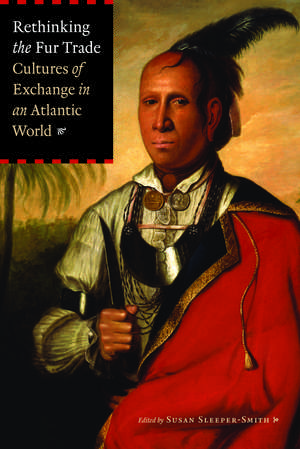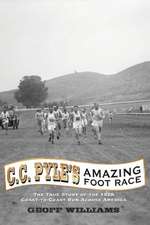Rethinking the Fur Trade: Cultures of Exchange in an Atlantic World
Editat de Susan Sleeper-Smithen Limba Engleză Paperback – dec 2009
Lucrative, far-reaching, and complex, the fur trade bound together Europeans and Native peoples of North America in the seventeenth and eighteenth centuries. Rethinking the Fur Trade offers a nuanced look at the broad range of contracts that characterized the fur trade, a phenomenon that has often been oversimplified and misrepresented. These essays show how the role of Native Americans was far more instrumental in the conduct and outcome of the fur trade than previously suggested.
Rethinking the Fur Trade exposes what has been called the “invisible hand of indigenous commerce,” revealing how it changed European interaction with Indians, influenced what was produced to serve the interests of Indian customers, and led to important cultural innovations. The initial essays explain the working mechanisms of the fur trade and explore how and why it evolved in a North Atlantic context. The second section examines indigenous perspectives through primary-source writings from the period and considers newly evolving indigenous perspectives about the fur trade. The final sections analyze the social history of the fur trade, the profound effect of the cloth trade on Indian dress and culture, and the significance of gender, kinship, and community in the workings of economic exchange.
Preț: 345.45 lei
Nou
Puncte Express: 518
Preț estimativ în valută:
66.12€ • 71.85$ • 55.58£
66.12€ • 71.85$ • 55.58£
Carte tipărită la comandă
Livrare economică 21 aprilie-05 mai
Preluare comenzi: 021 569.72.76
Specificații
ISBN-13: 9780803243293
ISBN-10: 0803243294
Pagini: 702
Ilustrații: 9 photos, 5 maps, 14 tables, 1 figure
Dimensiuni: 152 x 229 x 41 mm
Greutate: 0.98 kg
Editura: Nebraska Paperback
Colecția University of Nebraska Press
Locul publicării:United States
ISBN-10: 0803243294
Pagini: 702
Ilustrații: 9 photos, 5 maps, 14 tables, 1 figure
Dimensiuni: 152 x 229 x 41 mm
Greutate: 0.98 kg
Editura: Nebraska Paperback
Colecția University of Nebraska Press
Locul publicării:United States
Notă biografică
Susan Sleeper-Smith, professor of history at Michigan State University, is the author of Indian Women and French Men: Rethinking Cultural Encounter in the Western Great Lakes and the editor of Contesting Knowledge: Museums and Indigenous Perspectives (Nebraska 2009).
Contributors: Dean Anderson, Donald F. Bibeau, Mary Black-Rogers, Bruce J. Bourque, Jennifer S. H. Brown, Allen Chronister, James L. Clayton, Bruce White, W. J. Eccles, William F. Ganong, James A. Hanson, Gail D. MacLeitch, D. Peter MacLeod, D. W. Moodie, Jacqueline Petersen, Carolyn Podruchny, Gail DeBuse Potter, Arthur J. Ray, Timothy J. Shannon, Susan Sleeper-Smith, Helen Hornbeck Tanner, Reuben Gold Thwaites, Sylvia Van Kirk, Richard White, and Ruth H. Whitehead.
Cuprins
List of Illustrations
List of Tables
Source Acknowledgments
Introduction: Cultures of Exchange in a North Atlantic World
Part 1. Indigenous Perspectives
Introduction
1. Of the Mission of Saint Francois Xavier on the "Bay of Stinkards," or Rather "Of Stinking Waters"
Father Allouez
2. On the Hunting of the Gaspesians
Father Chrestien LeClercq
3. The Hunting of Moose, of Bears, of Beavers, of Lynxes, and Other Animals According to Their Seasons
Father Chrestien LeClercq
4. Tarrentines and the Introduction of European Trade Goods in the Gulf of Maine
Bruce J. Bourque and Ruth Holmes Whitehead
5. The Anishinabeg Point of View: The History of the Great Lakes Region to 1800 in Nineteenth-Century Mississauga, Odawa, and Obijwa Historiography
D. Peter MacLeod
6. Fur Trade Literature from a Tribal Point of View: A Critique
Donald F. Bibeau
Part 2. The Social and Political Significance of Exchange
Introduction
7. Agriculture and the Fur Trade
D. W. Moodie
8. "Give Us a Little Milk": The Social and Cultural Significance of Gift Giving in the Lake Superior Fur Trade
Bruce M. White
9. "Starving" and Survival in the Subartic Fur Trade: A Case for Contextual Semantics
Mary Black-Rogers
10. The Growth and Economic Significance of the American Fur Trade, 1790<EN>1890
James L. Clayton
11. "Red" Labor: Iroquois Participation in the Atlantic Economy
Gail D. MacLeitch
12. The Fur Trade and Eighteenth-Century Imperialism
W. J. Eccles
13. The Middle Ground
Richard White
14. Creative Misunderstandings and New Understandings
Richard White
Part 3. Cloth Trade
Introduction
15. Indians as Consumers in the Eighteenth Century
Arthur J. Ray
16. Dressing for Success on the Mohawk Frontier: Hendrick, William Johnson, and the Indian Fashion
Timothy J. Shannon
17. The Flow of European Trade Goods into the Western Great Lakes Region, 1715<EN>1760
Dean L. Anderson
18. The Matchcoat
Gail DeBuse Potter
19. Chiefs Coats Supplied by the American Fur Company
Allen Chronister
20. The Myth of the Silk Hat and the End of the Rendezvous
James A. Hanson
Part 4. Gender, Kinship, and Community
Introduction
21. Women, Kin, and Catholicism: New Perspectives on the Fur Trade
Susan Sleeper-Smith
22. "The Custom of the Country": An Examination of Fur Trade Marriage Practices
Sylvia Van Kirk
23. Woman as Centre and Symbol in the Emergence of Metis Communities
Jennifer S. H. Brown
24. Prelude to Red River: A Social Portrait of the Great Lakes Métis
Jacqueline Peterson
25. The Glaize in 1792: A Composite Indian Community
Helen Hornbeck Tanner
26. Festivities, Fortitude, and Fraternalism: Fur Trade Masculinity and the Beaver Club, 1785<EN>1827
Carolyn Podruchny
Index
List of Tables
Source Acknowledgments
Introduction: Cultures of Exchange in a North Atlantic World
Part 1. Indigenous Perspectives
Introduction
1. Of the Mission of Saint Francois Xavier on the "Bay of Stinkards," or Rather "Of Stinking Waters"
Father Allouez
2. On the Hunting of the Gaspesians
Father Chrestien LeClercq
3. The Hunting of Moose, of Bears, of Beavers, of Lynxes, and Other Animals According to Their Seasons
Father Chrestien LeClercq
4. Tarrentines and the Introduction of European Trade Goods in the Gulf of Maine
Bruce J. Bourque and Ruth Holmes Whitehead
5. The Anishinabeg Point of View: The History of the Great Lakes Region to 1800 in Nineteenth-Century Mississauga, Odawa, and Obijwa Historiography
D. Peter MacLeod
6. Fur Trade Literature from a Tribal Point of View: A Critique
Donald F. Bibeau
Part 2. The Social and Political Significance of Exchange
Introduction
7. Agriculture and the Fur Trade
D. W. Moodie
8. "Give Us a Little Milk": The Social and Cultural Significance of Gift Giving in the Lake Superior Fur Trade
Bruce M. White
9. "Starving" and Survival in the Subartic Fur Trade: A Case for Contextual Semantics
Mary Black-Rogers
10. The Growth and Economic Significance of the American Fur Trade, 1790<EN>1890
James L. Clayton
11. "Red" Labor: Iroquois Participation in the Atlantic Economy
Gail D. MacLeitch
12. The Fur Trade and Eighteenth-Century Imperialism
W. J. Eccles
13. The Middle Ground
Richard White
14. Creative Misunderstandings and New Understandings
Richard White
Part 3. Cloth Trade
Introduction
15. Indians as Consumers in the Eighteenth Century
Arthur J. Ray
16. Dressing for Success on the Mohawk Frontier: Hendrick, William Johnson, and the Indian Fashion
Timothy J. Shannon
17. The Flow of European Trade Goods into the Western Great Lakes Region, 1715<EN>1760
Dean L. Anderson
18. The Matchcoat
Gail DeBuse Potter
19. Chiefs Coats Supplied by the American Fur Company
Allen Chronister
20. The Myth of the Silk Hat and the End of the Rendezvous
James A. Hanson
Part 4. Gender, Kinship, and Community
Introduction
21. Women, Kin, and Catholicism: New Perspectives on the Fur Trade
Susan Sleeper-Smith
22. "The Custom of the Country": An Examination of Fur Trade Marriage Practices
Sylvia Van Kirk
23. Woman as Centre and Symbol in the Emergence of Metis Communities
Jennifer S. H. Brown
24. Prelude to Red River: A Social Portrait of the Great Lakes Métis
Jacqueline Peterson
25. The Glaize in 1792: A Composite Indian Community
Helen Hornbeck Tanner
26. Festivities, Fortitude, and Fraternalism: Fur Trade Masculinity and the Beaver Club, 1785<EN>1827
Carolyn Podruchny
Index
Recenzii
"Rethinking the Fur Trade is an invaluable book."—Claiborne A. Skinner, Annals of Iowa
"Rethinking the Fur Trade is a welcome and valuable addition. . . . It succeeds in giving multiple perspectives on the cultures of exchange and the fur trade for a wide audience."—Chris Johnson, North Dakota History










